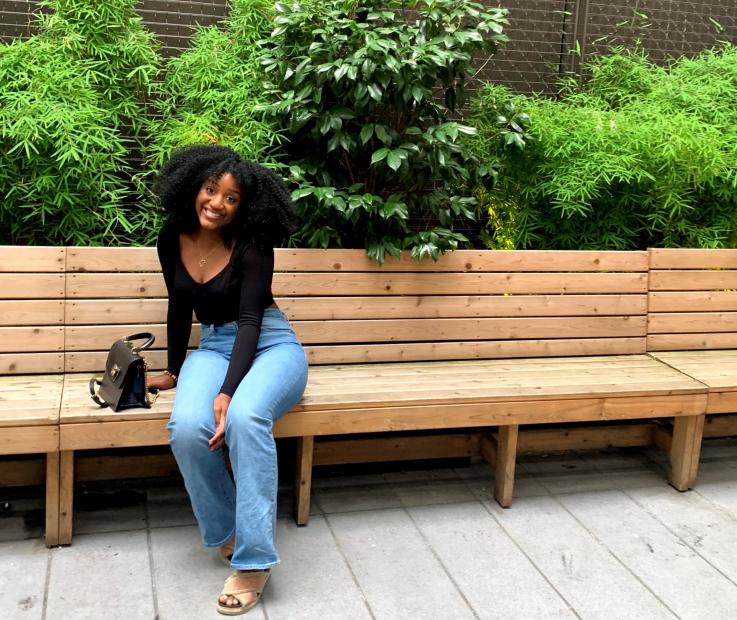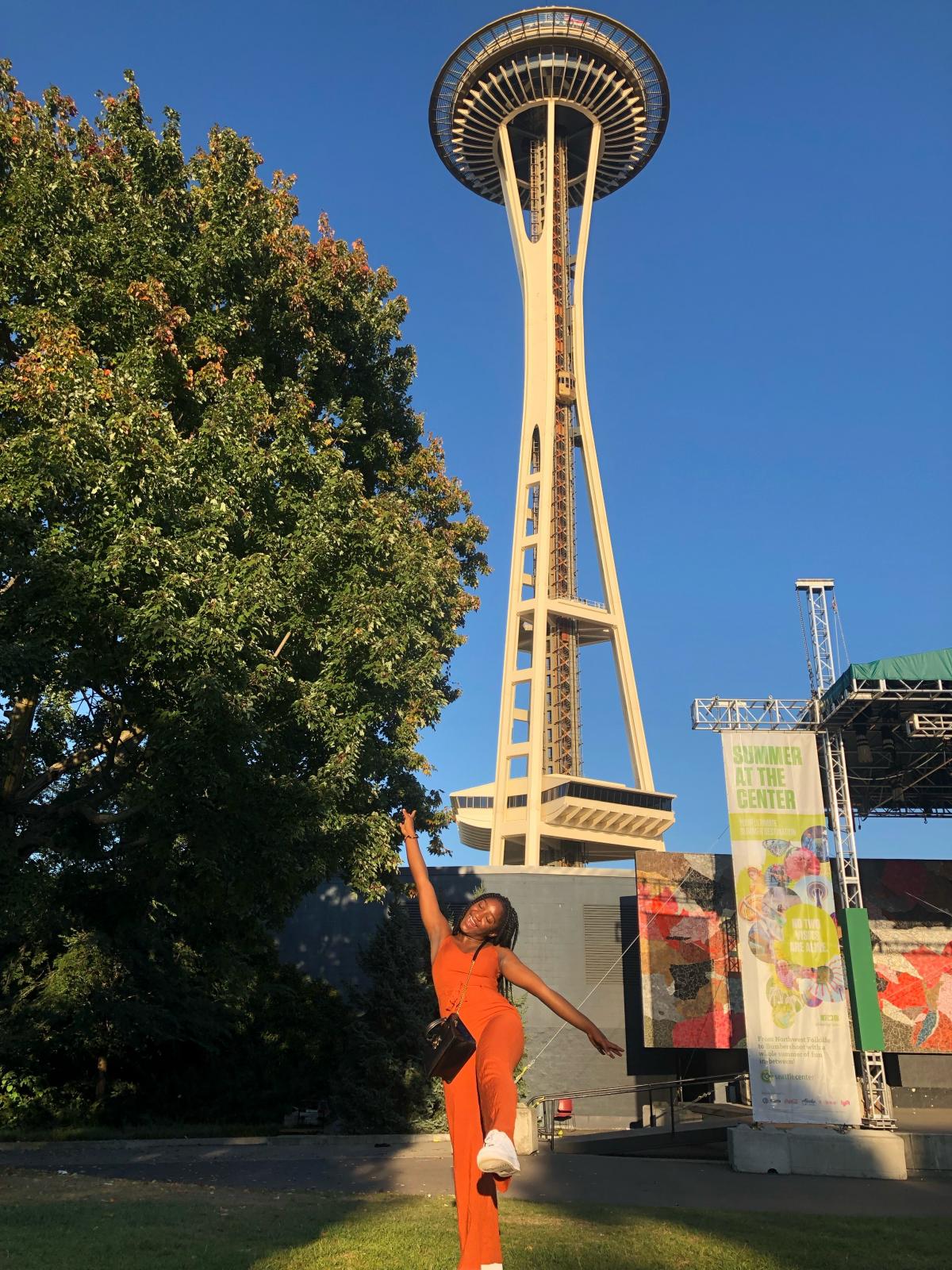Born during the Second Congo War, Sabrina Ebengho grew up in Équateur province in the Democratic Republic of the Congo (DRC) before immigrating to the United States at the age of 13. Sabrina is now pursuing her education at the University of Washington, and is among the first undergraduate Public Health-Global Health majors completing the Global Health option. In the future, she seeks to improve access to quality healthcare for all in the DRC and beyond, focusing on women, adolescents, and children’s health, and education. She is passionate about equity and racial justice locally, and active in spreading information about COVID-19 amongst the Congolese community in Tacoma, where she lives. We sat down with Sabrina to learn more about her time at UW.
Q. Why did you decide to major in public health-global health?
A. I’ve always been exposed to the idea of public health growing up. My dad worked as a medical doctor and public health professional back home, while my mom was actively involved in health advocacy and immunization as a Community Health Worker (CHW). Both of them heavily focused on HIV work for as long as I can remember. Having lived through challenging health issues back home, I’ve always been curious and asked my parents and relatives questions as they worked on health programs in our city. One outbreak I vividly remember was cholera. I decided to major in PH-GH to fight for a better world where equitable access to quality health services is a reality for all, especially for marginalized communities.
Q. Why are you passionate about global health?
A. Health disparities and outbreaks were especially prevalent in the province I was raised in - and they still are to this day. My personal experience and the countless stories of my own community, in addition to the global community, inspired my passion and urge to pursue the field of global health.
Q. What do you find most interesting about the field of global health?
A. Implementing evidence-based interventions to improve health outcomes and leaving a sustainable impact on communities is vital. Public/global health gives you the lenses to understand and seek ways to improve health at a population level. That to me is very interesting – having the potential for a large-scale impact.
Q. How did you find your way to the UW?
A. I immigrated to the U.S at the age of 13 and have lived in Washington since. I learned to navigate the educational system here in America through my older siblings and high school English as a Second Language teachers and advisors. And as I joined the UW, I took Dr. Todd Faubion’s introduction to global health course during my sophomore year. His class helped pinpoint my purpose, introducing and reassuring my commitment to apply for the major. Meeting Dr. Steve Gloyd and Todd Faubion opened doors to opportunities within the School of Public Health/Department of Global Health and beyond. Steve and Todd are really amazing. The staff and faculty I’ve connected with helped me find my way here.
Q. Tell us about your extracurricular activities.
A. I am a member of the Black Student Union and the African Student Association. I was involved with the UW Daily for a bit, but my schedule didn’t allow me to continue. Other than that, I’m always volunteering and interning to challenge and extend learning beyond lecture halls; it’s really important for me to gain valuable work and research experience while building a network in the public/global health community as an undergrad. I am currently interning at Global WACh with an amazing team of mentors. I also love playing soccer, working out, and being outdoors when I have free time, which is rare.
Q. What experiences at the UW have been most influential?
A. Getting to work with different public health organizations has given me the chance to develop a new lens to understand and approach public health issues. Networking in the School of Public Health and Department of Global Health has definitely been one of the most influential experiences here. I've met well-rounded individuals from diverse backgrounds who are very passionate about the field. This entire journey of working and meeting people in the department has really opened my eyes and shifted my perceptions. I went from thinking that I didn't have what it takes to pursue something as big as public health to fully seeing myself as capable and part of the future of public health. So just meeting inspiring people and getting to learn from and work with them has really influenced my journey here at UW.
Q. What are your professional goals?
A. The COVID-19 pandemic has really put us all in uncertain positions. My hope is to complete my bachelor's this upcoming spring quarter and spend time working back home and/or within the continent. I want the opportunity to develop concrete goals and deepen my understanding of the current global health landscape and its challenges. Essentially, my goal is to complete my MPH while working, then pursue a PhD in Global Health and Implementation Science. I want to be part of health institutions that research and implement evidence-based interventions to strengthen health systems and improve service quality and accessibility for marginalized communities back home and here.
Q. You’re going to be graduating this year. What’s one piece of advice you have for prospective students coming into global health?
A. When I first came to UW, I was a prospective political science and journalism major. I then also considered economics and geography, international studies, and sociology, before finally committing to public health. That process really helped me discover the things I'm curious about. I encourage students to explore their interests, I think that's really important. Take the classes that will awaken your curiosity and help you explore what you may be passionate about. Through my journey of exploring these different majors, I gave myself the chance to discover my curiosity and passion. My advice to prospective students is to explore their interests as much as they can because sooner or later they will discover their passion. Also, get involved on and off campus. This will really enrich your college experience. Getting involved helps you meet people from different backgrounds, and teaches you so much about yourself and the world around you. And I feel that is a beneficial perspective to bring into the real world after college - get involved and explore.
Q. Can you share an interesting fact about yourself?
A. I've been to 17 countries so far. I love traveling. It teaches you to adapt in new environments while learning about cultures from diverse groups of individuals. Most importantly, I think a key element of public health-global health that you gain from exploring the world is cultural and intellectual humility.
Q. Where is your hometown?
A. Seattle and Tacoma are my hometowns here in the U.S, and Mbandaka is my beloved hometown in the DRC.
Q. Anything else you’d like to share?
A. I’m grateful for the amazing mentors I have, and the continuous learning opportunities offered through the School of Public Health and Department of Global Health.

